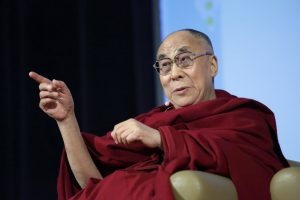By Abhijnan Rej

The United States has appointed a new special coordinator for Tibetan issues, Secretary of State Mike Pompeo said on October 14. Assistant Secretary of State responsible for the Bureau of Democracy, Human Rights, and Labor Robert A. Destro will now also serve concurrently in that position. The United States’ decision to appoint a designated point person for Tibet comes amid sky high tensions with China.
“Special Coordinator Destro will lead U.S. efforts to promote dialogue between the People’s Republic of China (PRC) and the Dalai Lama or his representatives,” among other activities, Pompeo’s statement notes, consistent with long-standing U.S. position.
In particular, the special coordinator’s position supports the 2002 Tibetan Policy Act. The Bush administration had appointed the first such special coordinator for Tibetan issues in May 2001. The position had remained unfilled, however, since January 2017.
A 2019 amendment and reauthorization of the 2002 act was passed by the House of Representatives in January this year. Reacting to the news, China had noted that it was “indignant at and firmly opposed to it.” However, given that the bill hasn’t completed the legislative process yet, it is effectively dead as of now.
Previously, President Donald Trump had signed a Reciprocal Access to Tibet Act in December 2018 through which the U.S. seeks greater access to Tibet on a reciprocal basis. At that time, the Chinese foreign ministry had noted that China “resolutely opposes” the law.
The 2019 Tibetan Policy and Support Act sought to establish a U.S. consulate in Lhasa, among other things. However, the bill proposed that any new Chinese demand for an additional consulate in the U.S. will be through a quid pro quo around an American consulate in Lhasa. Given that it is highly unlikely China will seek to open another consulate in the U.S. – the one in Houston was in fact shut down in July this year – this proposal is academic in nature.
Should the 2019 bill, which enjoys bipartisan support, be reintroduced in a similar form in the future, the special coordinator will seek to facilitate “unconditional” dialogue between China and the Dalai Lama “or his representatives or democratically-elected leaders of the Tibetan community.” Such language aims to checkmate China’s own candidate as the Dalai Lama’s eventual successor as Beijing desperately seeks to shape the end game there as a means to legitimize its control over Tibet. As former senior Indian intelligence officer and advisor on Tibetan affairs Amitabh Mathur told NPR last year, “the Dalai Lama’s reincarnation is a civilizational struggle between China and Tibetans over who controls Tibetan Buddhism.”
“The United States remains concerned with the PRC’s repression of the Tibetan community, including the lack of meaningful autonomy, the deteriorating human rights situation in Tibetan areas, and severe restrictions on Tibetans’ religious freedom and cultural traditions within China,” Pompeo’s statement noted.
But it is important to note that the appointment of a new special coordinator in itself does not amount to much, beyond adding to the Trump administration’s increasingly loud, angry, and often unwise rhetoric when it comes to China. The timing of the new appointment is also curious, just weeks before the U.S. presidential elections, especially after the Trump waited almost four years to fill the special coordinator position. (If Trump loses the November 3 election, it is entirely possible the incoming Biden administration could replace Destro, a political appointee, with someone else.)
Meanwhile, China has reacted harshly to the appointment of the new special coordinator. Foreign ministry spokesperson Zhao Lijian noted in a press briefing earlier today that “the setting up of the so-called special coordinator for Tibetan issues is entirely out of political manipulation to interfere in China’s internal affairs and destabilize Xizang [China’s nomenclature for Tibet].” He also asked Pompeo to “stop fabricating all sorts of lies about China.”
No comments:
Post a Comment